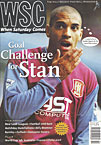 Billy Bremner passed away last month, so Don Watson remembers the Leeds United and Scotland legend
Billy Bremner passed away last month, so Don Watson remembers the Leeds United and Scotland legend
We all know the hush that follows an opposition goal, but we know too that there are as many different kinds of hush to a football fan as there are types of snow to an Eskimo. Disbelief, resignation, bewilderment and anger can all be expressed in that silence.
The first goal I ever saw at a live football match was scored by the visitors, Leeds United, playing against Celtic at Hampden Park for a place in the final of the European Cup. The scorer was Billy Bremner, who had been the focus of the Scottish media before the game. The old St Mary’s pupil, coming back to play against the side he had supported as a boy.
It was one of those shots from outside the penalty area whose trajectory you can scarcely see until it crashes against the inside stanchion and bounces down inside the goal. The aggregate scores were levelled at 1-1, and wee Billy was running right towards me, punching at the air and looking up at someone (no doubt he had a family full of mixed loyalties in the stand).This time the hush was heavy with respect. He might have been playing for the opposite team, but there was a tacit acknowledgment that he was one of us, and a grudging admission that it had been one hell of a goal.
When, a couple of years later I moved to England, much against my better judgment, the fact that I was following Bremner’s path to Leeds was my only consolation. Bremner was an easy player to identify with, because he played the game like he was one of us – his sheer competitiveness was electrifying. When you saw him, clutching at a hacked shin and limping off to try and settle up with some six -foot Brazilian in the ’74 World Cup, he stirred the emotions because his aura of injured resentment echoed your feelings perfectly.
Running around Hampden in a lap of honour after inspiring Scotland’s first victory over England in many a year, he and the other ginger genius Jimmy Johnstone signalled up to the press box to the English journalists who had written them off, with a salute that expressed the fans’ feelings with devastating economy.
When he punched Kevin Keegan in the Charity Shield at Wembley you cheered, because let’s face it, who outside of Liverpool at that time did not want to punch Kevin Keegan? Indeed Bremner himself might have had few fans in England outside Leeds, but in Scotland it was different. He seemed to embody Scottish football in the same way as he embodied Leeds United.
Despite the received view of him, he was no football philistine. Even a few years before his death, he talked in awe of Puskás’s legendary appearance in Glasgow for the European Cup final in 1960, a game he himself had watched from the terraces of Hampden.
Alongside Billy’s competitive edge was a sophisticated vision shown in the speed at which he could distribute the ball to telling effect. But he also had a certain cavalier sense of his own qualities. While he respected the giants of European football, he had, in an age when Stein’s Celtic had carried Europe before them, the classless confidence of the Celt. Sadly it’s difficult to imagine David Hopkin and Craig Burley in France this summer having a private competition as to how many times they can nutmeg their opposite number, as Bremner and Billy Mc-Neil once did against Italy at Hampden.
Perhaps that cavalier edge, that meant he partied as hard off the pitch as he played on it, was partly responsible for the fact that so many memories of Billy involve glory just out of reach: crashing in the goal against Barcelona at Elland Road that would see Leeds through to the European Cup final, only to collide with Norman Hunter in the Park des Princes final and drift momentarily offside as Sepp Maier was beaten by Peter Lorimer’s shot that would have put Leeds in front; holding his head in his hands after knocking the ball wide of an open goal, during his best game ever as Scotland thrashed Brazil 0-0 in Munich in 1974.
Derailed hedonism was certainly responsible for his premature retirement from international football after the ‘incident in a Copenhagen night-club’ of popular cliché. Perhaps it even contributed to the fact that he is no longer with us. I can remember little about Billy’s reign as a manager at Elland Road, and that is probably the way to keep it.
Instead my final memory of him is at his testimonial at Elland Road, as he ran to the Kop, the place he knew the real supporters stood. And there stood Billy Bremner, with the league championship trophy in his hands. It was a moment we all hoped would never end.
From WSC 132 February 1998. What was happening this month